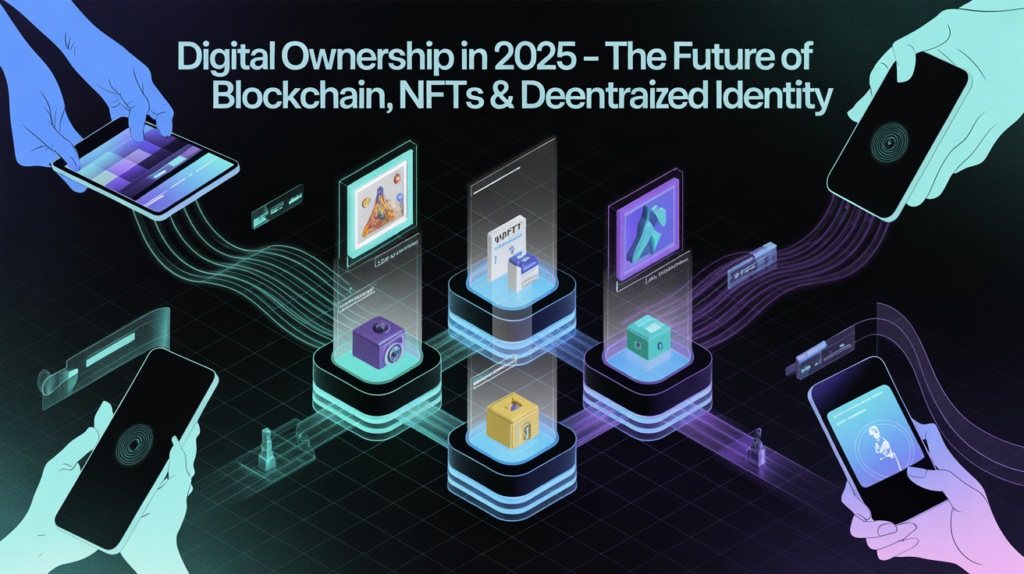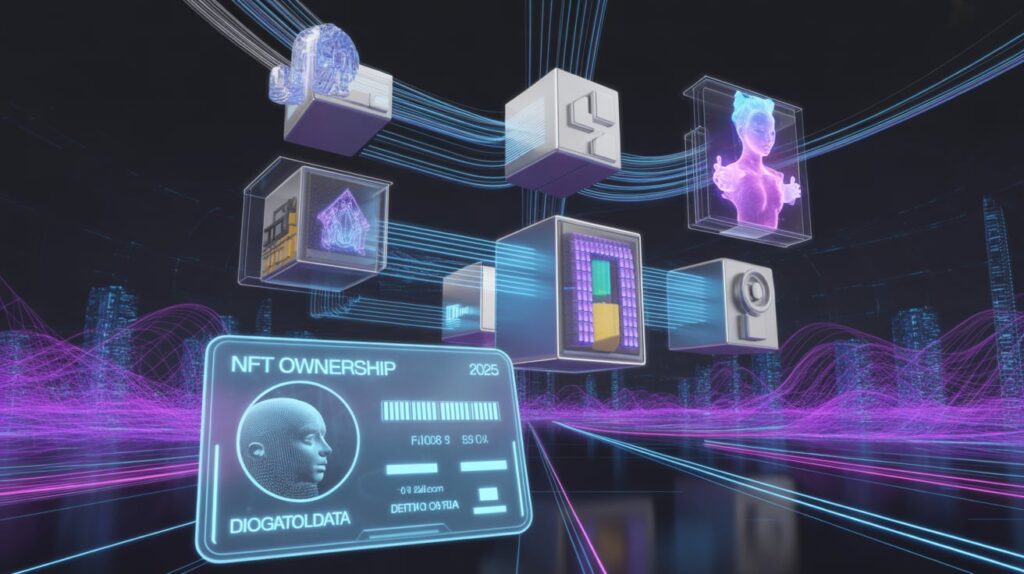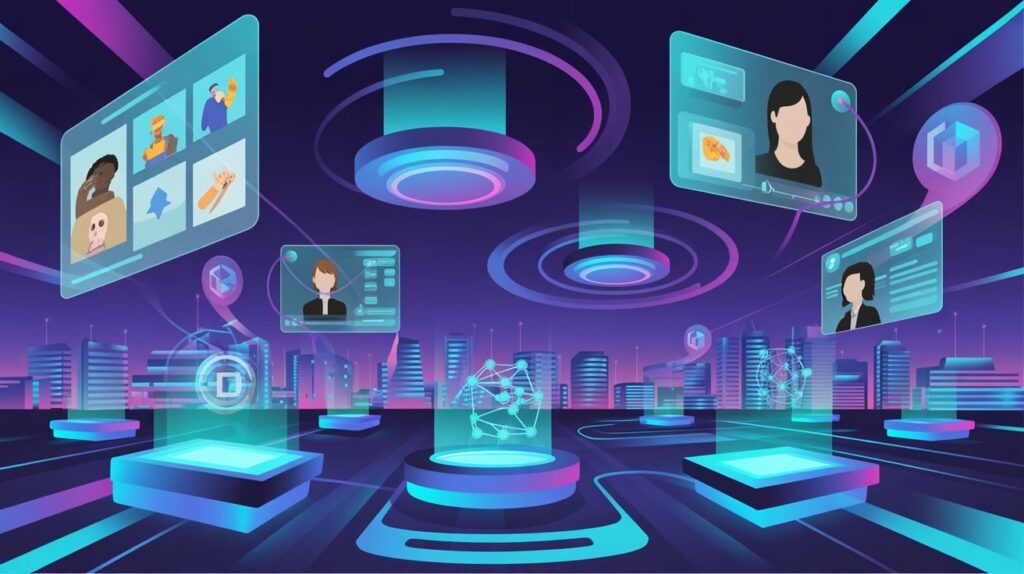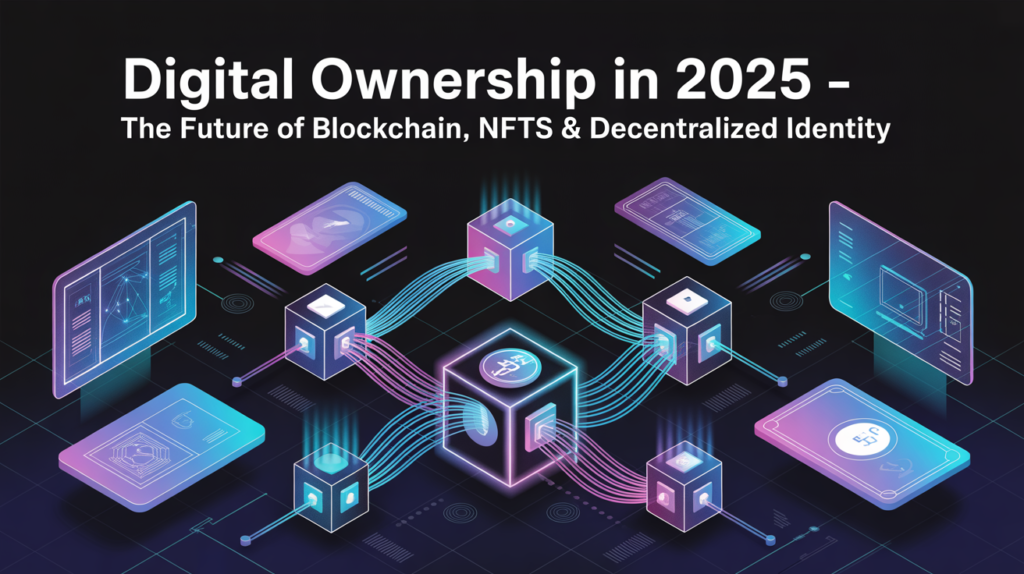Digital Ownership in 2025 — The Future of Blockchain, NFTs & Decentralized Identity
The digital era has entered a transformative stage — one where control, authenticity, and identity no longer rely on centralized platforms but on cryptographic proof. According to BTCMARKETNEWS, Digital Ownership in 2025 represents a paradigm shift in how individuals and organizations define, secure, and trade value in the digital world.
As blockchain technology, NFTs, and decentralized identity systems evolve, the internet is witnessing a reformation from “platform-owned” data to user-owned ecosystems. This article explores how these technologies are redefining digital property, privacy, and personal freedom in 2025 and beyond.
The Evolution of Digital Ownership
A decade ago, owning something online meant little more than having a username and password. Music, photos, in-game items, and even social profiles were hosted on centralized servers — controlled by corporations, not users.
But Digital Ownership in 2025 is different. It’s built on blockchain’s immutable ledger, where every transaction and piece of data is traceable, verifiable, and most importantly, owned by you.
BTCMARKETNEWS analysts note that the concept of “ownership” has expanded from physical goods to digital assets — ranging from NFTs and domain names to decentralized credentials and metaverse land. Blockchain ensures that every asset is cryptographically linked to its rightful owner, enabling trust without intermediaries.
Blockchain: The Foundation of the Ownership Revolution
At the core of Digital Ownership in 2025 lies blockchain — the transparent, decentralized technology ensuring that ownership cannot be altered, duplicated, or revoked by any central authority.
Blockchain’s role is no longer limited to cryptocurrencies. It’s the universal infrastructure for verifying digital rights. From intellectual property verification to supply chain provenance, blockchain acts as the trust layer of the internet.
Leading corporations and governments are integrating blockchain-based registries to authenticate ownership of patents, art, and even educational degrees — making the digital world as verifiable as the physical one.
NFTs: From Art Craze to Utility-Driven Assets
The early hype around non-fungible tokens (NFTs) may have focused on digital art and collectibles, but Digital Ownership in 2025 reveals a more mature phase of NFT evolution.
NFTs have transformed into functional assets — representing tickets, loyalty programs, gaming items, music royalties, and real estate deeds. They provide proof of ownership, authenticity, and transferability on the blockchain.
According to BTCMARKETNEWS, global NFT trading volume has rebounded to over $50 billion in 2025, with major brands using NFTs for consumer engagement, access control, and intellectual property protection.
What makes NFTs truly revolutionary now is interoperability — users can transfer their assets between games, virtual worlds, and digital wallets, reinforcing the principle of true digital ownership.
Decentralized Identity: Taking Back Control of Personal Data
One of the most exciting developments within Digital Ownership in 2025 is decentralized identity (DID). Unlike traditional logins or social accounts, DID systems let users own and control their digital identities across platforms.
Imagine logging into a bank, healthcare system, or social app without sharing your personal data — just cryptographic proof of verification. That’s decentralized identity in action.
Projects like Worldcoin, ENS (Ethereum Name Service), and Polygon ID are pioneering DID frameworks where individuals can create self-sovereign identities stored in blockchain wallets.
BTCMARKETNEWS experts explain that decentralized identity is essential for both privacy and compliance, allowing users to verify age, credentials, or nationality without surrendering personal data to corporations or governments.
The Metaverse & Virtual Property Rights
The concept of digital land, avatars, and virtual goods has matured significantly. In the metaverse, users no longer rent experiences — they own them.
Digital Ownership in 2025 extends to virtual worlds powered by blockchain, where individuals buy and sell metaverse property as NFTs. Platforms like Decentraland, The Sandbox, and Otherside have established entire economies based on digital ownership.
Major real estate firms now tokenize physical property, enabling partial digital representation in metaverse environments. This blend of virtual and physical ownership blurs the line between reality and the digital frontier.
Legal and Regulatory Shifts Supporting Digital Ownership
Regulation is catching up. In 2025, new legal frameworks in the U.S., Europe, and Asia recognize blockchain-based ownership records as legally enforceable.
Governments are developing standards for NFT taxation, digital IP protection, and decentralized identity compliance. These steps, BTCMARKETNEWS notes, legitimize the growing digital economy and protect investors from fraud.
Moreover, courts have begun accepting on-chain records as valid proof of ownership — a historic milestone that solidifies blockchain’s role in global commerce.
Digital Ownership in the Enterprise Sector
Corporations are embracing blockchain for asset management and data verification. Intellectual property rights, supply chain authenticity, and corporate identity systems are now being recorded on blockchain to ensure transparency.
In the Digital Ownership in 2025 era, companies are using NFTs to authenticate software licenses, digital certificates, and IoT device identities.
This not only prevents counterfeiting but also enhances traceability and accountability in industries such as finance, healthcare, and manufacturing.
Economic Impact of Digital Ownership
The financial implications of Digital Ownership in 2025 are enormous. As digital assets become tradeable, they contribute billions to the global economy.
NFT royalties, on-chain music licensing, and metaverse property rentals generate new income streams for creators and investors alike. BTCMARKETNEWS estimates that 25% of global digital commerce now involves blockchain-backed ownership — an indicator of the world’s growing reliance on decentralized trust.
Challenges: Security, Interoperability & Education
Despite progress, Digital Ownership in 2025 faces several challenges.
-
Security risks: Wallet hacks and phishing scams remain common.
-
Interoperability gaps: Some blockchains and wallets are not fully compatible.
-
Lack of user education: Many still misunderstand the concept of self-custody.
BTCMARKETNEWS emphasizes that widespread education and better user interfaces are critical for achieving mass adoption and reducing risk across the decentralized ecosystem.
The Future: Self-Sovereign Economies
Looking beyond 2025, digital ownership will become central to how societies function. With blockchain enabling peer-to-peer exchange, digital citizens will participate in self-sovereign economies where identity, property, and value flow freely — without intermediaries.
As BTCMARKETNEWS highlights, the next stage of digital evolution will integrate AI, Web3, and quantum-safe cryptography to protect and scale ownership rights across the internet.
The result: a future where individuals truly own their data, creations, and wealth — a promise that the early internet could never deliver.
Conclusion
The age of Digital Ownership in 2025 represents more than a technological evolution — it’s a societal transformation. Blockchain, NFTs, and decentralized identity are creating a digital world where control and authenticity rest in the hands of users, not corporations.
As BTCMARKETNEWS continues to report, this shift will redefine power, privacy, and profit in the digital age. The future is not just about connecting — it’s about owning what you create, earn, and represent online.
FAQs – Digital Ownership in 2025
1. What does Digital Ownership in 2025 mean?
It refers to the ability to own and control digital assets, data, and identity using blockchain, NFTs, and decentralized systems.
2. How do NFTs support digital ownership?
NFTs provide verifiable proof of ownership and authenticity for digital goods such as art, music, tickets, and property deeds.
3. What is decentralized identity?
It’s a blockchain-based system that lets users verify their identity without depending on centralized institutions.
4. Is digital ownership legally recognized?
Yes. Many jurisdictions now recognize blockchain-based ownership records as valid proof under digital asset laws.
5. How can I stay updated on Digital Ownership trends?
Follow trusted sources like BTCMARKETNEWS for expert insights, market analysis, and reports on blockchain innovation.



